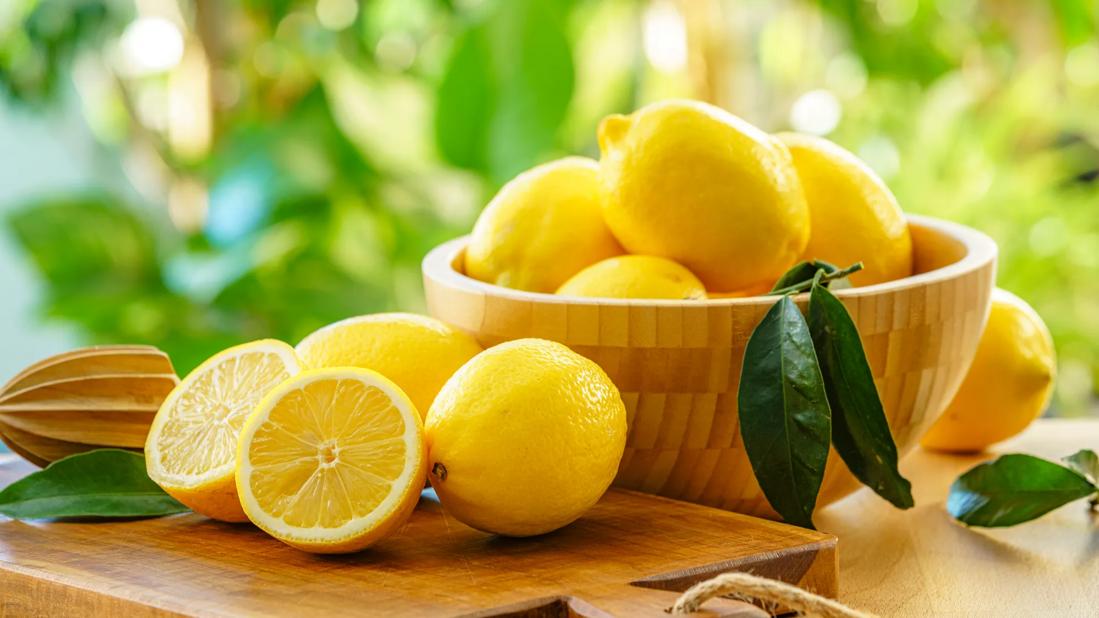From protecting against cellular damage to helping prevent kidney stones, lemons are as healthy as they are tangy

Image content: This image is available to view online.
View image online (https://assets.clevelandclinic.org/transform/23b87888-c044-4c32-977a-1635af87fa22/lemons-2178111697)
A wooden bowl of whole lemons, with cut lemons around it, on an outdoor table
Zesty on the outside and sour on the inside, lemons typically don’t enjoy front-and-center status in the fruit bowl. But their nutrient content rivals any other fruit.
Advertisement
Cleveland Clinic is a non-profit academic medical center. Advertising on our site helps support our mission. We do not endorse non-Cleveland Clinic products or services. Policy
Registered dietitian Julia Zumpano, RD, LD, explains the health benefits of lemons and shares tips on how you can incorporate them into your everyday diet.
Lemons and lemon juice contain several essential vitamins and minerals that your body needs to stay healthy.
“Lemons contain lots of vitamin C, fiber and plant compounds,” says Zumpano. “And the same components that make lemons sour also offer important potential benefits, from boosting your immune health and reducing oxidative stress to lowering your risk of kidney stones.”
Lemons are also a low glycemic fruit, which means they won’t cause your blood sugar to spike.
According to the U.S. Department of Agriculture (USDA), one large lemon, without its peel, provides approximately:
A lemon also contains 44.5 milligrams of vitamin C, nearly half of your daily value (DV).
Here’s how this sunny yellow fruit works to boost your wellness.
Vitamin C, which lemons are chock full of, may have a protective effect on your heart, according to research. Eating fruits and vegetables high in vitamin C — like lemons, other citrus fruits and certain leafy greens — may reduce your risk of coronary artery disease.
Advertisement
“Heart disease is so common,” notes Zumpano. “But we can improve heart health by eating a variety of nutrient-rich whole foods like lemons.”
Lemons are a potent source of antioxidants, which our bodies need in order to reduce the harmful effects of oxidative stress. Oxidative stress damages your cells and organs, and plays a part in the development of many chronic diseases, like:
According to Zumpano, eating a diet that’s rich in antioxidants helps keep damaging free radicals in balance. Among the antioxidants found in lemons (many of which are in the peel) are:
Kidney stones are no fun. These stones form in the kidneys when minerals and other substances create crystals.
“They can be incredibly painful as they work their way out of the urinary system,” says Zumpano. “Larger ones may even require surgery. And if you get kidney stones once, you’re likely to get them again.”
But research suggests that lemons can help prevent kidney stones, which are on the rise. Two substances in lemons — citric acid and vitamin C — change urine chemistry to keep stones from forming. In fact, urologists sometimes call dietary treatments for kidney stones “lemonade therapy.”
As a great source of vitamin C, lemons are one of many foods that can help your body better absorb iron.
“Iron is important for helping your blood and tissues get enough oxygen, which boosts energy levels and benefits organ health,” explains Zumpano.
Maintaining healthy iron levels also helps prevent iron-deficiency anemia, a blood disorder.
“Eating plenty of iron doesn’t mean your body absorbs and uses all of it,” she continues. “You need to be getting enough vitamin C to feel its full benefit.” Pair iron-rich foods with vitamin C, such as adding a lemon balsamic dressing to a steak salad.
The vitamin C in lemons can help your immune system work better, especially during cold and flu season. A 2016 study found that getting enough vitamin C may shorten the duration of the common cold and upper respiratory infections.
Advertisement
“When you’re sick, you lose vitamin C quickly because it’s so highly concentrated in your immune cells,” says Zumpano. “Drinking tea with lemon is one way to replenish your stockpile.”
The vitamin C and antioxidants in lemons may also boost your immune health by reducing inflammation.
There are plenty of great ways to add lemon and lemon juice into your daily routine, from starting your day with a refreshing glass of lemon water to sneaking lemon into fruit smoothies and homemade salad dressings or marinades. The flavor of lemons also pairs well with seafood, pasta, grilled veggies and the occasional bite of something sweet.
From flavoring your food to keeping you healthy, a little sour power can go a long way!
Advertisement

Sign up for our Health Essentials emails for expert guidance on nutrition, fitness, sleep, skin care and more.
Learn more about our editorial process.
Advertisement
The tropical fruit is a good source of antioxidants and vitamin C
High amounts of cholesterol and saturated fat in red meat may be linked to heart disease
The leaves and pods from this tree are rich in essential nutrients
This starchy root vegetable is a staple in many global cuisines — but it has to be prepared correctly, or it can cause serious concerns
These delicate green sprouts can give you an extra dose of vitamin K and other nutrients — but they’re not safe for everyone
Edamame, lentils and chicken breast are good sources of protein
Eating this root vegetable can help support your eye, heart and brain health
The flavorful herb is full of antioxidants that may help regulate blood sugar
Although it could be used as a moisturizer, this new trend is not recommended
Communicating clear limits helps protect your time, energy and emotional well-being
High cholesterol can be genetic, but testing and treatment can lower your heart disease risk